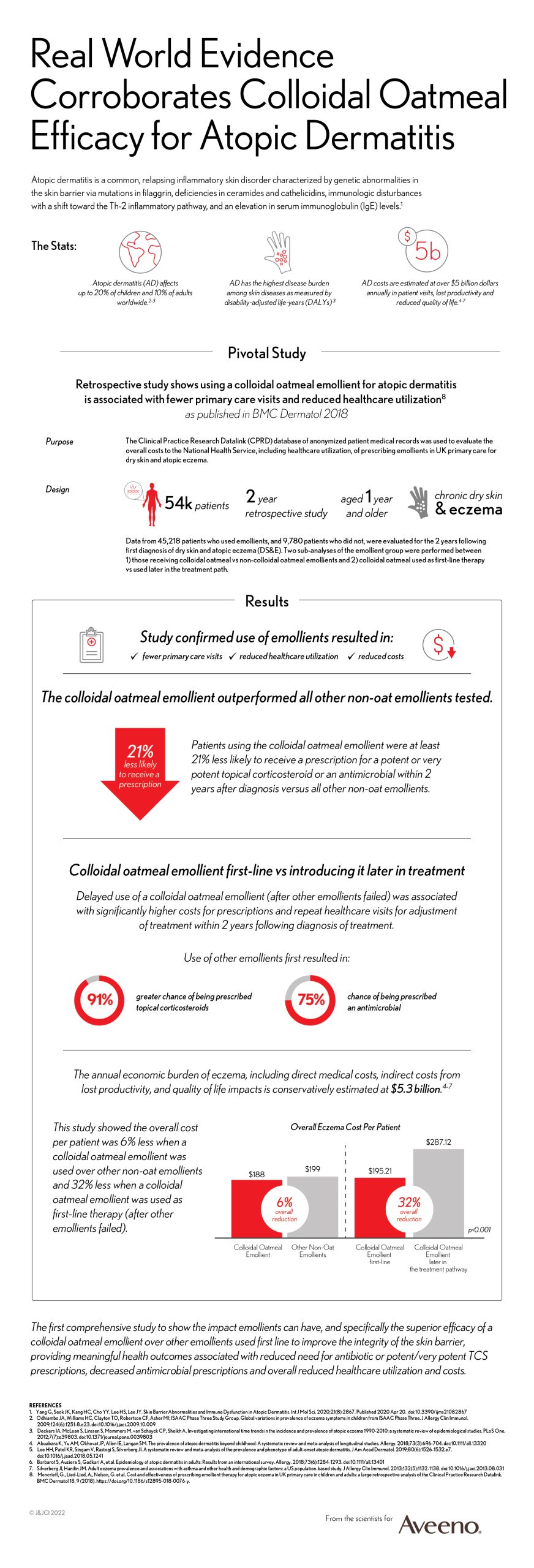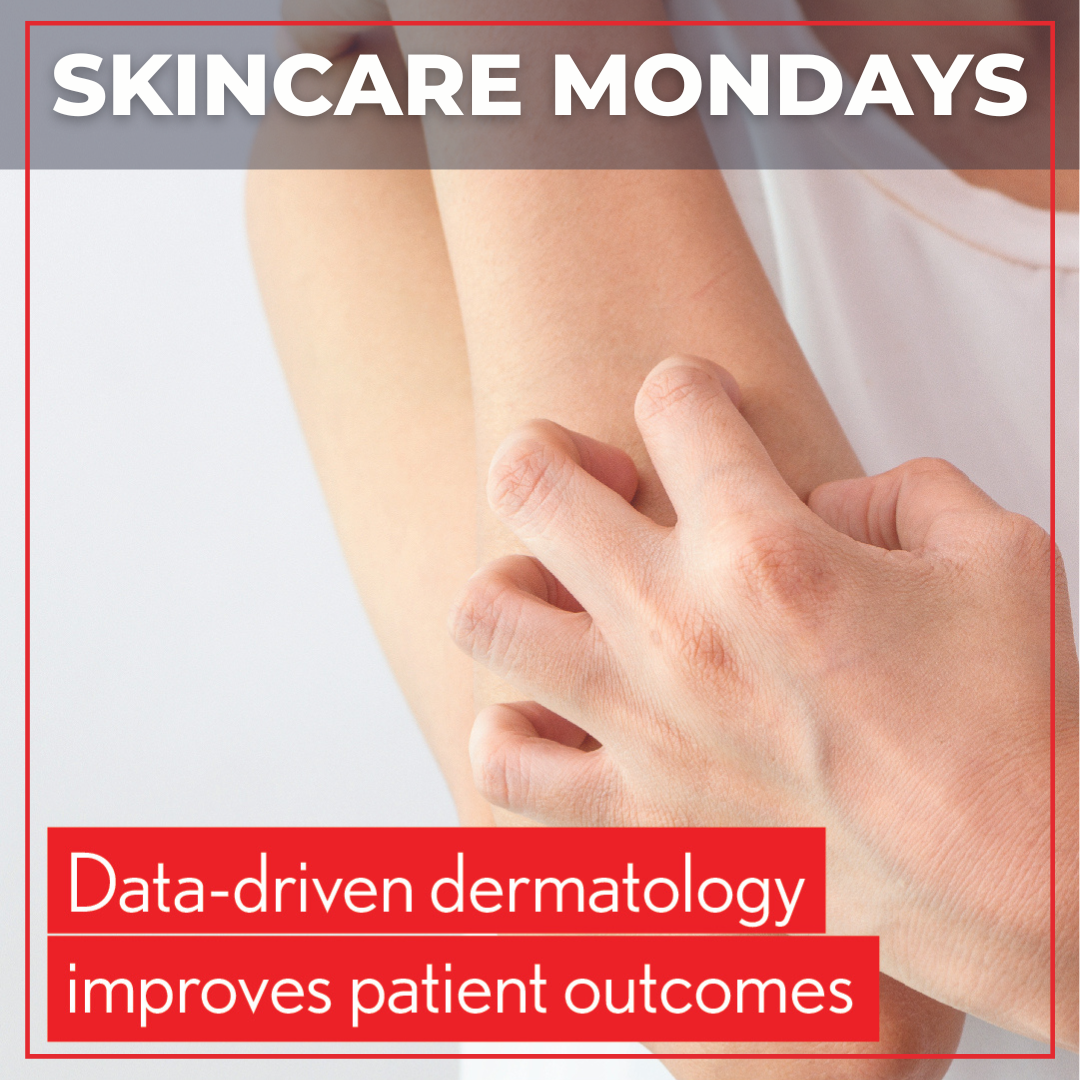Data-Driven Dermatology Improves Patient Outcomes
The use of real–world data and real–world evidence to inform health care decisions is increasing. While randomized controlled trials (RCTs) are still the gold standard for evidence-based medicine, the strict inclusion/exclusion criteria and tightly controlled conditions limit their generalizability to real-world clinical practice. Real world evidence (RWE), generated during routine clinical practice, is becoming increasingly important in determining effectiveness outside of the tightly controlled conditions of RCTs, and is now recognized by regulatory bodies such as the US Food & Drug Administration (FDA) and European Medicines Agency (EMA) as a valuable complement to RCTs.1
Real world data (RWD) is collected in routine clinical practice and can be gathered prospectively or retrospectively via a range of studies including prospective and retrospective observational studies, patient registries and post-marketing studies.
Real world evidence (RWE) is the clinical evidence about the usage and potential benefits or risks of a medical product derived from analysis of RWD.
Source: US FDA2
Real–world evidence and observational studies help to bridge the gap in knowledge that exists between clinical trials and clinical practice. Compared with RCTs, RWE better reflects the actual clinical environments in which medical interventions are used, including patient demographics, comorbidities, adherence, and concurrent treatments.3
Real World Evidence Corroborates Colloidal Oatmeal Efficacy for AD
Atopic dermatitis (AD) is a common, relapsing inflammatory skin disease with pruritus, characterized by recurrent exacerbations and remissions.4 AD impairs patients’ quality of life and places a heavy burden on patients.5
The efficacy and safety of colloidal oatmeal formulations for the treatment of children and adults with mild to moderate atopic dermatitis is well established, proven to reduce itch severity and improve quality of life in clinical trials.6-8
In fact, colloidal oatmeal is the only single skin protectant OTC active ingredient that can claim to temporarily protect and help relieve symptoms of eczema as recognized by the US FDA & Health Canada OTC Monographs.9,10
Retrospective study shows using emollients for AD results in fewer primary care visits and reduced healthcare utilization11
This is the first comprehensive study to show the impact emollients, and specifically AVEENO® can have over other emollients when used as first-line therapy for the treatment of AD. Over 54,000 patients with chronic dry skin and eczema were identified using the UK Clinical Practice Research Datalink (CPRD) and their records were reviewed for the 2 years following first diagnosis.
AVEENO® Colloidal Oatmeal lotion reduced the need for prescription steroids and antimicrobials11
Patients using AVEENO® first over other emollients were at least 21% less likely to receive a prescription for a potent or very potent topical corticosteroid or an antimicrobial within 2 years after diagnosis. This supports previous research suggesting emollient use can reduce the need for a TCS prescription12-15 Timely prescribing of AVEENO® to improve the integrity of the skin barrier can also result in fewer flares.16-17
This study used real world evidence from children and adults with chronic dry skin and eczema to confirm that the use of emollients results in fewer primary care visits, reduced healthcare utilization and reduced costs in the treatment of AD.
Learn more here or click on the infographic image below.

References:
-
- Skin Protectant Drug Products for Over-the-Counter Human Use; Final Monograph. 68FR33362.June 4, 2003. Available from: http://www.fda.gov/downloads/Drugs/DevelopmentApprovalProcess/DevelopmentResources/Over-the-CounterOTCDrugs/StatusofOTCRulemakings/ucm091520.pdf Accessed 6.28.21
- Health Canada: Medicated Skin Care Products Monograph: http://webprod.hc-sc.gc.ca/nhpid bdipsn/atReq.do?atid=skin_peau&lang=eng Accessed 6.28.21
- Bartlett VL, Dhruva SS, Shah ND, Ryan P, Ross JS. Feasibility of Using Real-World Data to Replicate Clinical Trial Evidence. JAMA Netw Open.2019;2(10):e1912869. doi:10.1001/jamanetworkopen.2019.12869
- Yang G, Seok JK, Kang HC, Cho YY, Lee HS, Lee JY. Skin Barrier Abnormalities and Immune Dysfunction in Atopic Dermatitis. Int J Mol Sci. 2020;21(8):2867. Published 2020 Apr 20. doi:10.3390/ijms21082867
- Deckers IAG, McLean S, Linssen S et al. Investigating international time trends in the incidence and prevalence of atopic eczema 1990–2010: a systematic review of epidemiological studies. PLoS One 2012; 7:e39803.
- Capone K, Kirchner F, Klein SL, Tierney NK. Effects of colloidal oatmeal topical atopic dermatitis cream on skin microbiome and skin barrier properties. J Drugs Dermatol. 2020;19(5):524-531.
- Parikh-Das A, Ganopolsky I, Moreira L, Vaught C. A clinical trial to determine the therapeutic benefit of an investigational over-the-counter cream on dry, itchy skin of adults and children with atopic dermatitis. JAAD. 2017;76(6 suppl 1):AB10.
- Clinical assessment of Aveeno® Eczema Therapy to alleviate dry to very dry skin or skin prone to atopic dermatitis and to improve the patients’ quality of life (n=75). Study sponsored by Johnson & Johnson do Brasil ind.Com. Prod. Para Saúde Ltda. Principal Investigator. Dr Lucia Helena Favaro de Arruda. Preliminary data presented by Dr Maria João Lopes at the ESPD Congress, Istanbul 2012.
- Nazha B, Yang JC, Owonikoko TK. Benefits and limitations of real-world evidence: lessons from EGFRmutation-positive non-small-cell lung cancer. Future Oncol. 2021 Mar;17(8):965-977. doi: 10.2217/fon-2020-0951. Epub 2020 Nov 26. PMID: 33242257.
- Real-World Evidence https://www.fda.gov/science-research/science-and-research-special-topics/real-world-evidence Accessed 6.28.22
- Moncrieff, G., Lied-Lied, A., Nelson, G. et al. Cost and effectiveness of prescribing emollient therapy for atopic eczema in UK primary care in children and adults: a large retrospective analysis of the Clinical Practice Research Datalink. BMC Dermatol 18, 9 (2018). https://doi.org/10.1186/s12895-018-0076-y.
- Msika P, De Belilovsky C, Piccardi N, Chebassier N, Baudouin C, Chadoutaud B. New emollient with topical corticosteroid-sparing effect in treatment of childhood atopic dermatitis: SCORAD and quality of life improvement. Pediatr Dermatol. 2008;25(6):606–
- Cork MJ, Britton J, Butler L, Young S, Murphy R, Keohane SG. Comparison of parent knowledge, therapy utilization and severity of atopic eczema before and after explanation and demonstration of topical therapies by a specialist dermatology nurse. Br J Dermatol. 2003;149(3):582–
- Harcharik S, Emer J. Steroid-sparing properties of emollients in dermatology. Skin Therapy Lett. 2014;19(1):5–
- van Zuuren EJ, Fedorowicz Z, Christensen R, APM L, BWM A. Emollients and moisturisers for eczema. Cochrane Database Syst Rev. 2017;2. https://doi. org/10.1002/14651858.CD012119.pub2.
- Ilnytska O, Kaur S, Chon S, Reynertson KA, Nebus J, Garay M, Mahmood K, Southall MD. Colloidal oatmeal (Avena Sativa) improves skin barrier through multi-therapy activity. J Drugs Dermatol. 2016;15(6):684–
- Lisante TA, Nunez C, Zhang P, Mathes BM. A 1% colloidal oatmeal cream alone is effective in reducing symptoms of mild to moderate atopic dermatitis: results from two clinical studies. J Drugs Dermatol. 2017;16(7):671–
Did you enjoy this Skincare Monday post? You can find more on our OTC Resource Center.

